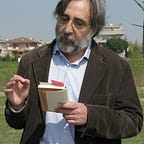THE CAVIAR LADY
My first novel translated into English
“A whopper! A whopper!” The cries go up and all of a sudden there are children streamingexcitedly along the main embankment. I jump on my bike and pedal along to catch up with them.
“Who caught it? Whose is it?” I question them urgently.
“The Turk, it’s the Turk’s,” they shoot back, hardly pausing for breath. Amelia who grows hay for rabbits shouts over: “What are you lot doing going to the Turk’s house? You know he’s got no family.”
“He’s got his niece now,” the children reply breathlessly, and when they run you can almost hear their labored breathing interspersed with the sound of their clogs: “A whopper! A whopper!”
The blur of criss-crossing legs flashing along the embankment soon attracts the attention of other children weeding the vegetable patches by their homes or mending the nets, who rush to join us. Their muscles are not tired and they race to overtake the others, because only the first to deliver the news gets the reward, the coin. The others can expect a piece of bread if they’re lucky. But not from the Turk, now Bechi lives there. Now that’s the house we all like best: because apart from the coin there are barley sugar sweets for everyone. Sweets you suck slowly, carefully, praying they’ll last forever. Mario and the other children say there’s never been anything like it among the fishing families. But the Turk comes from the East, they always say, respectfully. He’s not really like us.
And it’s long-legs Mario who puts on a sprint finish and gets to the Turk’s house first, pulling up short at the last minute and almost falling over his feet, stirring up a cloud of dust with his clogs. He’s beating on the door with his fists when the others rush up yelling. Bechi opens, smiling. Mario looks at her but has no breath, or strength, left to speak.
“A whopper! A whopper!” shout the others, piling in behind him, pushing and jostlingto get to the front, to be in his place, mouths open showing teeth, pulling at each other’s sweaters and jackets. Mario catches his breath, swallows and blurts out:
“We don’t know if it’s a female, but it’s big, really big. The others had to help him get it in the boat. Nicola almost fell in the river, the Turk was all red and swearing every time he pulled up the net…”
Bechi smiles. I peek at her and I think she looks like a fairy queen: what does she care about how they caught the sturgeon? No-one even knows where she’s from, I remind myself. All that counts is the money: one fish, if it’s really that big, will see you through the season. Bechi sees me and gives me a little wave:
“Hi Nellino!”
From The Caviar Lady.
La signora del caviale, by Italian writer Michele Marziani, originally published by Cult Editore in 2009, has been recently reissued in a new edition and with a different book cover by Antonio Tombolini Editore for its book series, Officina Marziani and is now available in English translation, curated by Anna Carruthers, with the title The Caviar Lady.
The story, set along the Po river during the World War II, is told by twelve-year-old Nellino, a boy whose life is turned up-side down by the war. Nellino narrates to the readers what he sees, what he understands of everyday life in an area that was renowned before the war for the high quality of caviar. At that time, the Po river was home to a great number of sturgeons and their eggs were sought after the world over.
The end of the war marked also the end of the presence of sturgeons in the Po river. The era of fine caviar was over and so was Nellino’s life as he knew it.
The Caviar Lady is a sweet and tragic story of friendship, love, loss and survival that uncovers a part of Italian culinary history still quite unknown.
The translator Anna Carruthers about this book: «It was a privilege to translate this wonderful book. Italy’s great Po river, which crosses the north of the country from west to east, has been a source of livelihoods and legends for centuries. Michele Marzani, who nurtures a life-long passion for river lore, has delved into recent history to evoke a forgotten way of life on these pages. His riverside community that ekes out a living fishing sturgeon from the Po is home to intriguing characters and depicted with a subtle vein of humour. Yet the second World War is about to change things for ever. Life in the fishing village, and the dramatic events that unfold with the onset of war, are seen through the eyes of 12 year old Nello. Nello’s coming-of-age story is deftly sketched and poignant, and skilfully interwoven with the broader historical picture, as he tries to make sense not only of growing up, but also what is taking place around him, with locals embracing Fascism, people mysteriously disappearing, and the story of his own absent father. If history is written by the victors, this moving tale explores the effects of Italy’s political reversals on a cast of captivating characters whose lives will never be the same again. An engaging, thought-provoking book that offers new insights into the turmoil of the Second World War and a fascinating glimpse of life on the river. I hope you enjoy reading it as much as I enjoyed translating it».
To purchase of copy:
